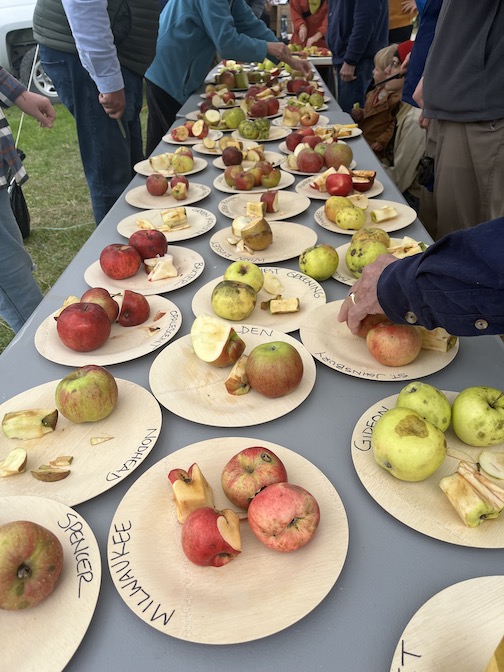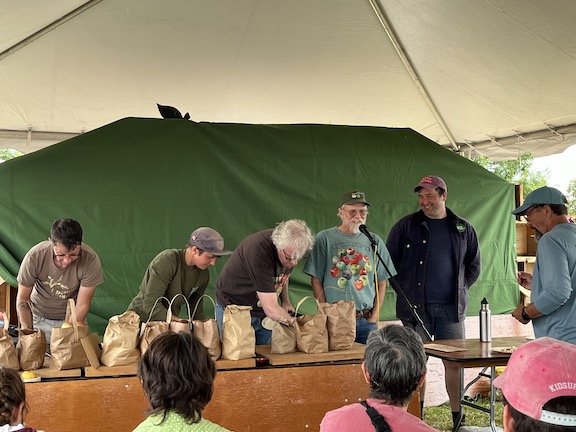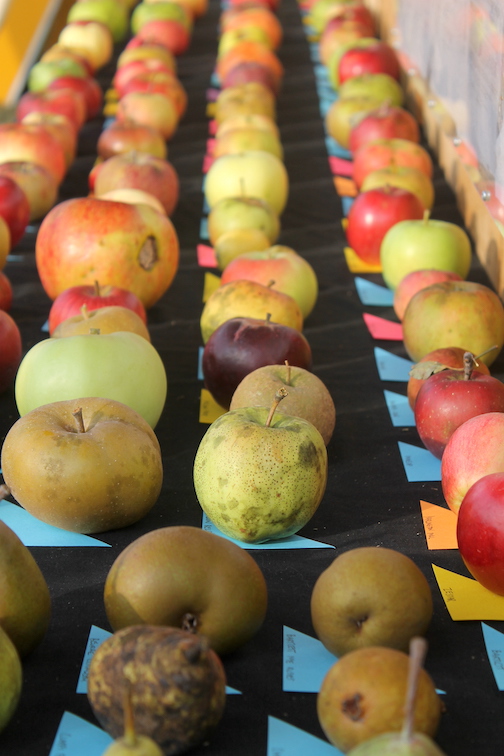By C.J. Walke, MOFGA’s Orchard Program Manager
At this year’s Common Ground Country Fair, the Hayloft Tent was packed with educational talks, abuzz with fruit enthusiasts hovering over our heritage fruit displays, and brimming with curious fairgoers looking to learn about topics such as beekeeping, beneficial plant propagation and permaculture, among many other things. However, the biggest draw in the Hayloft by far was the apple tastings held each day, highlighting a dozen or so heritage varieties at each tasting, and providing folks with a little taste of Maine’s pomological heritage and history.

The tastings were emceed by two key volunteers of the Maine Heritage Orchard (MHO), John Bunker and Sean Turley, who shared historical information about the varieties in hand, while also adding a bit of personal color and context with their fruit exploring anecdotes. Off to the side, half a dozen other MHO staff and volunteers frantically cut apples and passed plates of fruit slices to keep the curious crowds satisfied. The most exciting and engaging part of these tastings is that they are not one-way lectures or reports — they require full audience participation!
Turley and Bunker talked about the variety currently being sampled (while the slicers rapidly cut the next) and solicited feedback from the crowd on tasting notes to describe the variety. People shouted out descriptors like “sweet, crisp, complex, delicious,” and in some cases “mealy, plain, bland, boring.” All comments were welcome and at each tasting we employed a volunteer scribe to take down notes from the event for future use (such as this article).
Each tasting concluded with the audience voting for their three favorite varieties and MHO volunteers doing their best to calculate votes by counting hands among an enthusiastic crowd that spilled outside the bounds of the Hayloft Tent. Though the mix of varieties was a little different each day, the common favorites were Chestnut (a dessert crab from Minnesota), Canadian Strawberry (a dessert apple discovered in Solon, Maine), Newt Grindle (a seedling apple from Blue Hill, Maine) and St. Edmund’s Russet (a highly-flavored russet of English origin).
New to this year’s tasting schedule on Sunday was the incorporation of a seedling apple tasting and naming, highlighting apples Bunker and Turley collected on a fruit exploration trip to Aroostook County in early September. After tasting samples from these nine seedlings, participants shouted out name suggestions and final names were chosen by consensus of the MHO crew. This was by far the rowdiest part of all the tastings and a great way to wrap up the weekend’s events.

The naming results are:
- Yellow Brute — Yellow apple from an old tree, Westmanland, Maine.
- Bearly Banana — Medium-sized, light yellow apple, small russet patch around the stem, Perham, Maine.
- Booseberry — Small- to medium-sized apple, pink with darker red stripes, Westmanland, Maine.
- Pucker Up — Medium-sized apple, light red stripes, somewhat resembles Wealthy, Presque Isle, Maine.
- Cream Corn — Medium-sized apple, red stripes, large russet patch around stem, Westmanland, Maine.
- Mic Check One Two, One Two — Large apple, red striped, blushed, Westmanland, Maine.
- Celery Sweet — Small-medium apple, yellow with russet netting, faint stripes, resembles Medaille d’Or, Perham, Maine.
- Nutting Bitter Sweet — Small apple, red striped, resembles Chestnut Crab, Perham, Maine.
- Gold Tooth — Small- to medium-sized apple, yellow with faint pink blush, Perham, Maine.

A bounty of apple varieties on display at the Hayloft Tent. Holli Cederholm photo
On Saturday and Sunday, David Fulton of Black Apple Farm in Blue Hill led a cider apple tasting with a number of classic cider apple varieties. Fulton is an avid cidermaker and he interwove the variety descriptions, history and uses with cidermaking techniques, and fielded questions from the audience while MHO volunteers sliced more apples. Some of the cider apples Fulton shared with the crowd were: Dabinett (medium-bittersweet from England), Kingston Black (bittersharp from England), Medaille d’Or (full bittersweet from France) and Ashton Bitter (full bittersweet from England).
For 2024, we are planning to have a similar lineup of apple and cider apple tastings on the schedule in the Hayloft Tent, led by familiar faces from the crew at the Maine Heritage Orchard. Audience participation is essential to these tasting events and we depend on your energy, enthusiasm and sophisticated palates to make it all happen. Thanks to the hundreds of fairgoers who joined us in the Hayloft Tent for these tastings and provided variety notes and names, and we look forward to seeing you all again at next year’s Common Ground Country Fair.
This article was originally published in the winter 2023-24 issue of The Maine Organic Farmer & Gardener.
